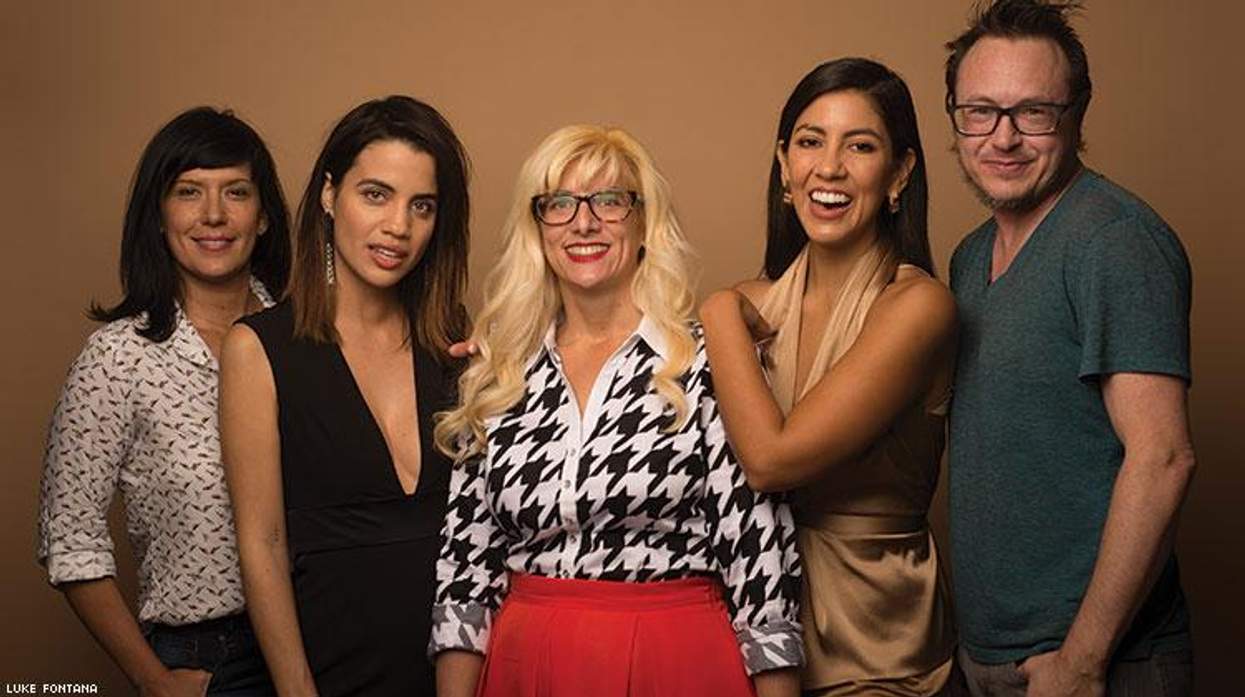Above: On the Set (from left): Associate editor Desiree Guerrero, Natalie Morales, me, Stephanie Beatriz, and deputy editor Jacob Anderson-Minshall
Anyone who doesn't think our culture is changing -- wonderfully, necessarily, but sometimes through difficult growing pains -- must not be paying attention to The Advocate. This last year, as a response to the world around us, we've changed not just who is behind many of our articles and videos but also the types of issues we're covering.
This magazine has been helmed by many a feminist. (In fact, you should read our former editor in chief Judy Wieder's remarkable recent memoir, Random Events Tend To Cluster, which follows her from 1960s Greenwich Village to The Advocate and beyond, intersecting with the Civil Rights, LGBT, and Animal Rights movements.)
But while Judy, and many editors before and after her (both female and male), personally identified as a feminist, I am sure they probably never imagined we'd have a "feminism editor" one day (as we do now in Tracy E. Gilchrist) -- or that we'd spend as much time covering the #MeToo and Black Lives Matter movements as we do LGBT rights.
I'm not just shouting out our coverage commitments, which we strive to improve in an effort to reflect the intersectionality that's going on in the U.S. in activism (a key to our success), politics (not nearly enough, I say), academic musings and even popular entertainment.
I'm really calling out the two women on our cover -- Brooklyn Nine-Nine's Stephanie Beatriz and Santa Clarita Diet's Natalie Morales -- who reflect, I think, the new marching orders for Hollywood and beyond. Both are smart, powerful, straightforward, and compassionate Latina women who are out and daring to define themselves as they see fit. Natalie has a tattoo from a book that both women loved as kids, The Little Prince. As they compared notes about their love of the fairy tale, I was thinking of the moral of the story: people must look beneath the surface, looking with our hearts as much as our eyes, to uncover the real truth and meaning. (An idea with renewed urgency.)
It seems to me that both of these queer millennial women are asking that we do so as well. To look beyond our surface differences, to see with our eyes, to find meaning as Hollywood -- and America -- struggles with the after-effects of widespread sexual harassment, uncovered resentment and racism, and a backlash to many of the gains we've made in the last decade not just as trans and queer folks, but also as people of color and immigrants.
 Yours in the struggle,
Yours in the struggle,
Diane Anderson-Minshall,
Editorial Director


 Yours in the struggle,
Yours in the struggle,


































































Charlie Kirk DID say stoning gay people was the 'perfect law' — and these other heinous quotes